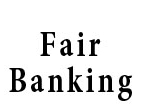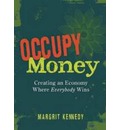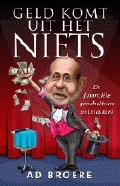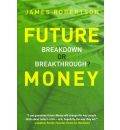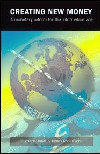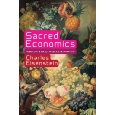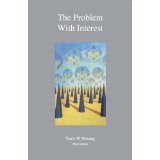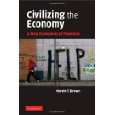Boeken
Kennis & inspiratie
Occupy Money. Creating an Economy Where Everybody Wins' - Margrit Kennedy
Geld komt uit het Niets - Ad Broere
Future Money, Breakdown or Breakthrough - James Robertson
Creating New Money: A Monetary Reform for the Information Age (PDF) - Joseph Huber & James Robertson
Sacred Economics: Money, Gift, and Society in the Age of Transition - Charles Eisenstein
Interest and inflation free money (PDF) - Margrit Kennedy
Het geld van de toekomst, een nieuwe visie op welzijn, werk en een humanere wereld (PDF) - Bernard A. Lietaer
(In het Nederlands alleen nog (gratis) online beschikbaar. Als boek wel tweedehands in het Engels: Future of money)
Ending the global casino? - Ad Broere
The end of money and the future of civilisation - Thomas Greco
The ecology of money - Richard J. Douthwaite
Banking: The root cause of the injustices of our time - Abdalhalim Orr & Abdassamad Clarke
Common wealth. For a free, equal, mutual and sustainable society - Martin Large
'
The problem with interest - Tarek El Diwany
Conclusion of the author:
I have argued that the original and most important reason for the growth of commercial banking was the profit that arose in the process of manufacturing money for lending at interest. Banking was the industry, money the product. In the modern world the same motives drives commercial banking but in a far more sophisticated way. An individual can be arrested for 'manufacturing' money in his own home but the commercial banking system is given the full protection of the law in doing what amounts to the same thing. There is no justice in this.
Every year the United States government pays hundreds of thousands of millions of Dollars in interest on its national debt. Other 'rich' nations are paying similarly huge amounts of interest on their own national debt. Yet this debt need not exist in the first place and the interest payments on it are therefore incurred unnecessary.
The commercial banking system in its current form inflicts a cost upon the whole of society, even those few whose finances are removed from the world of banking and debt. Fractional reserve banking is a major cause of inflation in the modern world, and the lending criteria on which it operates encourages speculative booms and large inequalities in wealth.
Society has always lived with the risk that events in the real world may prove harmful to its wealth. In most cases, it has responded by designing an infrastructure that minimises these risks. Yet where our monetary arrangments are concerned we find ourselves saddled with an infrastructure that is inherrently unstable, that actually increases the amount of risk society must bear. The ill effects of real world events can be magnified out of all proportions by the workings of a flawed monetary system. Indeed, the system itself has now become a source of risk to society.
Knowing what dangers lurk within the modern world of banking and finance, the politicians are obliged to battle for its stability. They call this battle 'monetary polic'. It is a policy in wich I do not believe. I argue for a currency of intrinsic value that cannot be manufactured by a monopoly of bankers or at the whim of the state. Real factors may reduce the purchasing power of money but the decisions of the financial establishment surely should not do so.
Nowadays, economic growth is heralded as the ultimate goal by so many governments. To an extent, this goal is forced upon society as it struggles to meet the interest charges on its debt. Whilst debt grows at compound interest towards infinity, in the physical world everything depreciates towards zero. I propose that the price we shall eventually pay for running this unwinnable race against compound interest is a polluted and depleted world.
In the absence of interest, our economic efforts would be directed away from wealth transfer and towards wealth creation. The entrepreneur would share his profit with the financier according to mutual good fortune, not an arbitrary rate of interest. The practice of leverage would disappear and with it the speculative mentality of our time. Business would be encouraged to preserve our environment, not to discount in into oblivion. And small scale enterprise would stand a better chance of competing with the debt leveraged monoliths that now so often overpower it.
Civilizing the economy: A new economics of provision - Marvin T. Brown
Het wondereiland Barataria (PDF) - Silvio Gesell
In dit boek beschrijft Gesell hoe in de zeventiende eeuw 500 gezinnen een eiland koloniseren. Ze zijn totaal geïsoleerd van de buitenwereld. Hij laat zien hoe de diverse geldstelsels uitwerken op de kleine samenleving Barataria. Aan de hand van dit verhaal toont Gesell wat de invloed van geld en rente is op de economie.
Money: Understanding and Creating Alternatives to Legal Tender - Thomas Greco
Een menselijke economie - Ad Broere
New Currency: How Money Changes The World As We Know It - Jordan Bruce MacLeod, Hazel Henderson
Fleeing Vesuvius, Overcoming the Risks of Economic and Environmental Collapse - Richard J. Douthwaite (ed.)
Creating wealth. Growing local economies with local currencies - Gwendolyn Hallsmith, Bernard Lietaer
Where does money come from? A guide to the UK monetary and banking system - Josh Ryan-Collins, Tony Greenham, Richard Werner and Andrew Jackson
